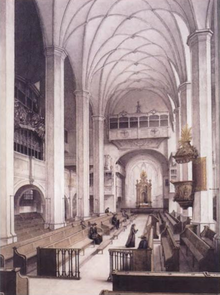Warum betrübst du dich, mein Herz, BWV 138
|
Warum betrübst du dich, mein Herz BWV 138 |
|
|---|---|
| Church cantata by J. S. Bach | |

Thomaskirche in Leipzig, where Bach's cantata Warum betrübst du dich, mein Herz was possibly first performed
|
|
| Bible text | |
| Chorale | Warum betrübst du dich, mein Herz |
| Vocal | SATB soloists and choir |
| Instrumental |
|
Warum betrübst du dich, mein Herz (Why do you trouble yourself, my heart),BWV 138, is a church cantata by Johann Sebastian Bach. He composed it for the 15th Sunday after Trinity and first performed it on 5 September 1723 in Leipzig. The text by an unknown author includes three stanzas from the hymn of the same name. Its text and melody were formerly attributed to Hans Sachs, but were written by an unknown hymn writer. The cantata has seven movements and is scored for SATB soloists and choir, two oboes d'amore, two violins, viola and basso continuo. The cantata has features of a chorale cantata although it was written a year before Bach's annual cycle of chorale cantatas. Bach used an aria as the base of the Gratias of his Missa in G major.
Bach wrote the cantata in his first year in Leipzig for the 15th Sunday after Trinity. The prescribed readings for the Sunday were from the Epistle to the Galatians, Paul's admonition to "walk in the Spirit" (), and from the Gospel of Matthew, from the Sermon on the Mount the demand not to worry about material needs, but to seek God's kingdom first (). Melody and words of the chorale, published in Nuremberg in 1561, were once attributed to Hans Sachs, but this seems not likely according to Albert Friedrich Wilhelm Fischer's Kirchenliederlexikon (1878). Its theme is close to the reading from the sermon on the mount. Different from later chorale cantatas, the words are not based exclusively on the complete chorale, but only on the first three of its fourteen verses, used in three movements, expanded by additional poetry. The unknown poet contrasted the theme of the chorale, trust in God, with the anxious questioning of single voices, stressed by contrast of the metric poetry of the chorale opposed to the free meter of many interspersed recitatives. A turning point from distress to trust is reached close to the end in the only aria of the cantata.
...
Wikipedia
